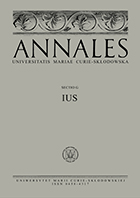Aequitas i iustitia w rzymskiej praktyce prawnej
Some Reflections on aequitas and iustitia in Roman Jurists’ Concepts
Author(s): Marek KuryłowiczSubject(s): Law, Constitution, Jurisprudence, History of Law, Ancient World
Published by: Wydawnictwo Naukowe Uniwersytetu Marii Curie-Sklodowskiej
Keywords: equity; justice; Roman law; Roman jurisprudence;
Summary/Abstract: Aequitas (equity) was part of the Roman conception of law (ius est ars boni et aequi), which in turn was, according to Roman jurists, grounded in justice (iustitia). The ideas of aequitas and iustitia in the broad sense are also found in various Latin legal phrases, a selection of which is cited in this article. They constitute significant arguments and topics in legal reasoning and justification even today. Some criteria of equity and justice can also be seen in how the concepts of aequitas or iustitia are applied to different situations (cases) or legal institutions (examples in the article). The most evident reference to aequitas in Rome was in the Praetor’s Edict and, consequently, it was the Praetor’s law, practically enforced in court, that turned into the main equity tendency in Roman law. Praetors were supported by the strongly deliberative activity of Roman jurisprudence. As a result, lawyers occupied the already accepted role of priests of law and justice (sacerdotes iustitiae). The discussed concepts were thus an expression of a creative approach to statutory interpretation. They stressed what was socially, morally and legally good, right and just, in the application of law. The idea of equity, conveyed by Roman law, eventually became a fundamental thesis of European legal culture.
Journal: Annales Universitatis Mariae Curie-Skłodowska, sectio G – Ius
- Issue Year: 66/2019
- Issue No: 1
- Page Range: 173-188
- Page Count: 16
- Language: Polish

